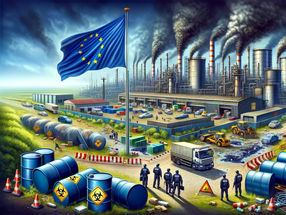Frost & Sullivan: New UK Government’s Green Policies Yield New Opportunities for the Chemical Industry
The new coalition government in the UK has outlined its collective plans for a low carbon economy. This presents significant opportunities for the rejuvenation of the chemical industry in the UK, based on green jobs and investments, as chemical products are the keystone of many green technologies. The policies of the new “green investment bank” could have a significant impact on the development of this sector if it encourages the development of renewable energy and green chemical manufacture.
The new feed-in tariff policy has the potential to catalyse the development of photovoltaic technologies in the UK. Germany, which introduced its first feed-in tariff in 2000, is now the biggest generator of electricity from photovoltaics in the world with a total capacity of 9.8 GW in 2009 compared to 0.03 GW in the UK. This is despite having much lower solar irradiation than countries such as Spain or Italy, and similar levels to the UK. “Increased deployment of photovoltaics has a knock-on effect on the chemical industry as the raw materials, such as solar grade silicon and industrial gases, are supplied by chemical manufacturers,” says Frost & Sullivan Industry Analyst, Dr. Nicola Rudd. “Several of these companies, such as PV Crystalox Solar and Linde, have facilities in the UK and could benefit from this increased local demand for photovoltaics.”
Introducing the necessary infrastructure to charge plug-in electric and hybrid vehicles is likely to drive demand for such vehicles. “The UK is going to be a manufacturing hub for electric vehicles, as demonstrated by Nissan’s announcement that they are going to be manufacturing electric vehicles in Sunderland from 2013,” says Rudd. “However, the materials required for electric vehicle batteries are largely sourced from Asia, particularly Japan, so there is an opportunity for the UK to develop the necessary expertise and manufacturing capabilities to satisfy this demand locally.”
Interpreting downstream trends, as seen in the examples above, is becoming increasingly important to chemicals and materials companies. In response to this, the Chemicals & Materials Division at Frost & Sullivan has restructured and focussed its activities on three vertical markets and four global mega trends. The new research areas look at chemicals and materials in transportation, construction & utilities and personal wellbeing. The impact of the key global mega trends, namely, low carbon economy, globalisation, health & wellness and functionality & performance, on the use of chemicals & materials in these markets are analysed by a global team of industry experts in order to support the growth ambitions of top global chemical companies.
Other news from the department politics & laws
Most read news
More news from our other portals
See the theme worlds for related content
Topic World Battery Technology
The topic world Battery Technology combines relevant knowledge in a unique way. Here you will find everything about suppliers and their products, webinars, white papers, catalogs and brochures.

Topic World Battery Technology
The topic world Battery Technology combines relevant knowledge in a unique way. Here you will find everything about suppliers and their products, webinars, white papers, catalogs and brochures.





























































